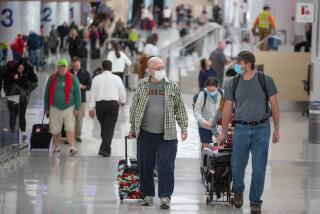Ban nets thousands of lighters
- Share via
Passengers surrendered more than 135,000 lighters at U.S. airports in the first five days after these items were banned from carry-on luggage, the U.S. Transportation Security Administration said last week.
Lighters already had been banned from checked baggage. Starting April 14, all lighters, whether powered by butane, absorbed-fuel systems (such as Zippos) or batteries, were prohibited from carry-ons.
Passengers still can carry up to four books of matches on planes, the TSA said.
Through Monday, fliers had given up about 8,800 lighters at LAX and 8,000 at the Las Vegas airport, said TSA spokesman Nico Melendez.
Some airports set up special bins at security checkpoints for discards. The lighters are sent to Science Applications International Corp., a TSA contractor based in San Diego that has many offices across the nation. The firm disposes of the lighters in compliance with local laws on hazardous materials, said company spokesman Jared Adams.
At some airports, fliers can ship their lighters to themselves. Phoenix’s airport runs a service for this and other banned items. Among the bigger private companies is CheckPoint Mailers Inc., www.checkpointmailers.com, based in Huntersville, N.C. It operates at about 20 airports, including San Diego and John Wayne in Orange County. LAX does not offer a mail-back service.
*
Southwest ends bonus
Southwest Airlines this month stopped giving extra frequent-flier credits for booking online at its website, vwww.southwest.com, a pioneering perk popular with customers for eight years.
The low-cost airline began awarding the double credits in February 1997. Instead of getting two credits per round trip, online bookers got four, reduced to three in early 2004. (It takes 16 credits for a free trip.)
Spokeswoman Brandy King said Southwest finally ended the bonus because “it served our purpose” of educating customers about the website.
*
State parks go Wi-Fi
You’ll soon be able to savor not just nature but also wireless Internet access at California state parks.
SBC Communications has installed wireless access, or Wi-Fi, at San Elijo State Beach near San Diego and San Clemente State Beach. By June, most of the state’s 85 parks are expected to be added to the system, said Alan Friedman, parks spokesman.
Until May 31, SBC’s DSL customers can add access at the parks and more than 6,000 other sites for free; after that, it’s $1.99 per month. Others can pay $7.95 per day when they sign on at the parks, buy a monthly SBC membership for $19.95 or buy time in advance, Friedman said. Wireless access to the parks’ site, vwww.parks.ca.gov, is free at the parks. For information, visit vwww.sbc.com/freedomlink.
-- Jane Engle
More to Read
Sign up for The Wild
We’ll help you find the best places to hike, bike and run, as well as the perfect silent spots for meditation and yoga.
You may occasionally receive promotional content from the Los Angeles Times.






